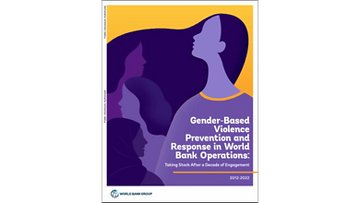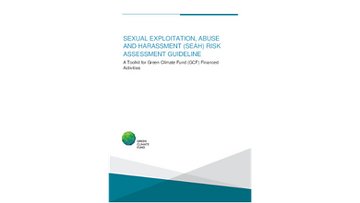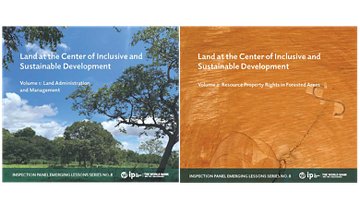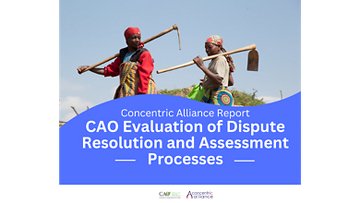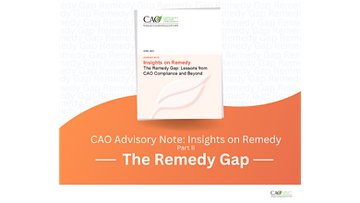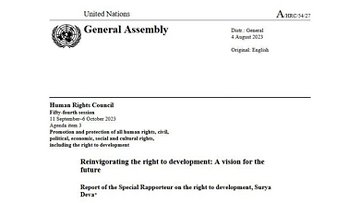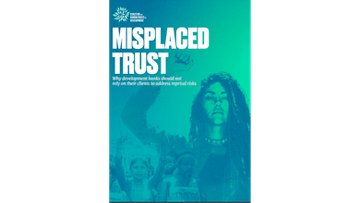Highlights of recent publications from independent accountability mechanisms, development finance banks, and institutions and civil society organizations working in the field of accountability
Reporting Accountability September 2023
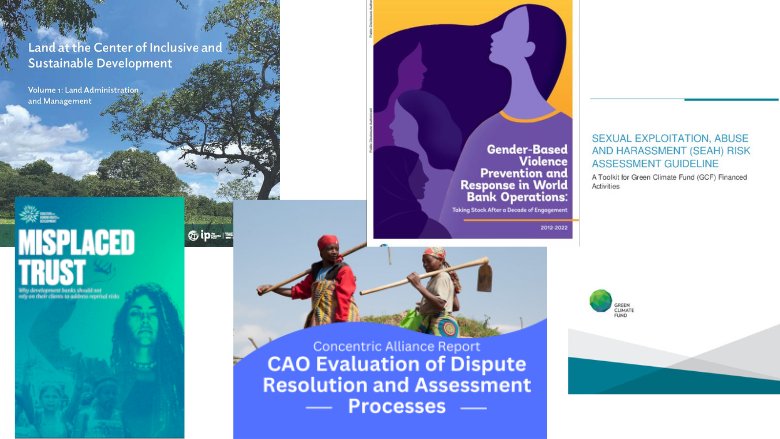
From this issue of Accountability Matters, we will be highlighting a selection of recent publications from independent accountability mechanisms, development finance banks, and institutions and civil society organizations working in the field of accountability. We don’t expect to cover everything, but we do hope we will make the task of keeping up with accountability a little easier. In this edition, we present reports from the World Bank, the World Bank Inspection Panel, the Green Climate Fund, the Compliance Advisory Ombudsman, the OHCHR Special Rapporteur on the right to development, and the Coalition for Human Rights in Development. Happy reading!
Gender-based violence prevention and response in World Bank operations: taking stock after a decade of engagement (2012-2022)
This report by the World Bank takes stock of the past decade of its efforts to prevent and respond to the critical developmental barrier of gender-based violence (GBV), in order to inform the way forward.
It finds that the institution – which has increased lending to activities preventing and responding to GBV from 38 to 390 operations in 97 countries in the last decade – offers unique entry points across all sectors in which it works to address GBV. Critical investments in staff’s technical capacity, purposeful high quality analytical work to inform project design and implementation, and partnerships at the global, national, and local levels have driven impressive progress on this agenda.
The findings of the report emphasize the link between preventing/responding to GBV and achieving development goals, and the importance of investment in capacity, analysis, and partnerships, among others. The report also outlines a guiding vision for deepening the work on GBV prevention and response in the decade ahead. This will support further investment in implementation, systematizing prevention and response across all lending operations, and ensuring that GBV activities are supported by global evidence.
Sexual exploitation, abuse and harassment (SEAH) risk assessment guideline
As part of the commitment of the Green Climate Fund (GCF) to address sexual exploitation, abuse and harassment (SEAH), its Revised Social and Environmental Policy envisaged the development of a SEAH Risk Assessment Tool. This tool is a guide to help the GCF Secretariat and clients understand SEAH and be able to assess SEAH risks related to proposed projects in order to predict, mitigate, and prevent SEAH. The tool applies to all GCF-financed activities and to both public and private sector entities.
The tool assists understanding of SEAH risks in GCF-financed activities, including across sectors. It then moves to risk assessment and mitigation across the project cycle, from concept note submission through to project closure, providing useful screening checklists for clients. Importantly, the tool emphasizes the need to take a survivor-centered approach in responding to reports of SEAH.
Land at the center of inclusive and sustainable development
Vol. 1: Land administration and management
Vol. 2: Resource property rights in forested areas
The eighth report in the Inspection Panel’s Emerging Lessons Series consists of two volumes.
Volume 1 focuses on Panel investigations of land administration and management projects, and explores some of the challenges of land tenure security, regularization, and titling and discusses the importance of assessing the context in which such activities are undertaken, and the challenges of stakeholder engagement associated with them. Cases from Honduras, Panama, Cambodia, and Kenya are presented.
Volume 2 focuses on resource property rights in forested areas and discusses relevant aspects of Panel investigations, which illustrate the need to assess adequately both the community forest property rights and the value of associated provisioning ecosystem services. Cases from Cambodia, the Democratic Republic of Congo, and Papua New Guinea are presented.
The cases presented in these two volumes provide useful insights, illustrate the interdisciplinary nature and the complexity of land-related development projects, and highlight the extra care that must be paid to the broader environmental and social risks.
CAO evaluation of dispute resolution and assessment processes
In 2020, an independent external review, commissioned by the IFC and MIGA Boards of Executive Directors, evaluated IFC/MIGA’s environmental and social accountability, including CAO’s role. Key recommendations from this External Review included assessments of CAO’s assessment and dispute resolution processes. This commissioned report from Concentric Alliance, completed in 2023, focuses on facilitating access to remedy; factors that determine whether a complaint transfers to dispute resolution or compliance review; the complexity of dispute resolution processes; factors contributing to case closures without settlements; and the overall success of dispute resolution processes.
The evaluation also generated recommendations addressing assessment, dispute resolution, CAO capacity, IFC/MIGA’s role, and collaboration with other independent accountability mechanisms. For instance, the authors recommend that complexity assessments become part of the CAO assessment process so as to obtain a better sense of the resources required for a given case. CAO is encouraged to strengthen its dispute resolution processes with regard to proactive case management, regular review, monitoring, communications, and documentation. Increased engagement and alignment between CAO and internal and external stakeholders, including other independent accountability mechanisms, is also recommended.
The remedy gap: lessons from CAO compliance and beyond
This CAO Advisory Note is part of a series that seeks to inform IFC and MIGA’s approach to remedial action to address potential or actual harm that may unintentionally arise in the development process. Drawing from CAO’s casework, this note explores the “remedy gap” that occurs when harm to people arising from the adverse impacts of IFC/MIGA projects is not remedied through the actions of IFC/MIGA or their clients. This may happen despite the commitments of the former to adhere to their environmental and social policy frameworks, and despite complainants attempting dispute resolution or undergoing a lengthy compliance process that may uphold their complaints. The note highlights contributing factors and presents findings and recommendations to help IFC and MIGA close remedy gaps.
The paper provides insights about factors that can lead to a remedy gap, and actions that can help close it. This includes ensuring people are aware of grievance redress options, including CAO; taking complainants’ concerns seriously; strengthening IFC/MIGA and client reporting on grievance and incident response; addressing concerns prior to investment exit; use of leverage; implementation of timely and responsive Management Action Plans; contributing to remedy where IFC/MIGA have contributed to harm; and identifying CAO cases where a significant remedy gap exists and measures to address these.
A/78/160: Role of business in realizing the right to development – Report of the Special Rapporteur on the right to development, Surya Deva
In this report by the United Nations Office of the High Commissioner for Human Rights (OHCHR) Special Rapporteur on the right to development, submitted to the General Assembly pursuant to Human Rights Council resolutions 33/14 and 51/7, a holistic vision of the right to development is presented, wherein business has an active role. The report unpacks the key components of the right to development and examines through illustrative examples the role of business in contributing to each aspect of economic, social, cultural, and political development. The Special Rapporteur then highlights three elements of the fundamental shift needed to realize this role of business in society: reorient the purpose of business, change irresponsible business models, and go beyond the “do no harm” approach. A roadmap is presented that seeks to harness the positive contribution of business and minimize the negative impacts of business activities on the right to development, including the vital enabling role that states and civil society organizations should play. The Special Rapporteur concludes his report with a set of recommendations for businesses, states, and civil society organizations.
Misplaced trust – Why development banks should not rely on their clients to address reprisal risks
"Misplaced Trust", published by the Coalition for Human Rights in Development, argues that development banks are putting human rights defenders at serious risk by relying on their clients to address reprisals.
The research, based on an analysis of 38 case studies of reprisals in the context of development projects, shows that in most cases development bank clients have played a direct role in the perpetration of attacks. Such attacks range from threats to killings, although criminalization is among the most common. The report finds that reprisals are typically perpetrated by security forces, private companies’ staff/contractors, and state and government officials. Clients also contribute to the conditions that lead to reprisals, including by failing to ensure meaningful consultations with communities. Furthermore, an analysis of the policies of eight major development banks shows that the banks tend to rely on client-generated information for processes (such as environmental and social risk assessments, stakeholder engagement, and consultations with affected communities) that are key to prevent and address reprisals.
The report includes a series of recommendations, indicating that development banks should not uncritically delegate such key processes and responses to reprisal risks to clients – they should develop protocols and guidelines for how they themselves can work on reprisal issues.

